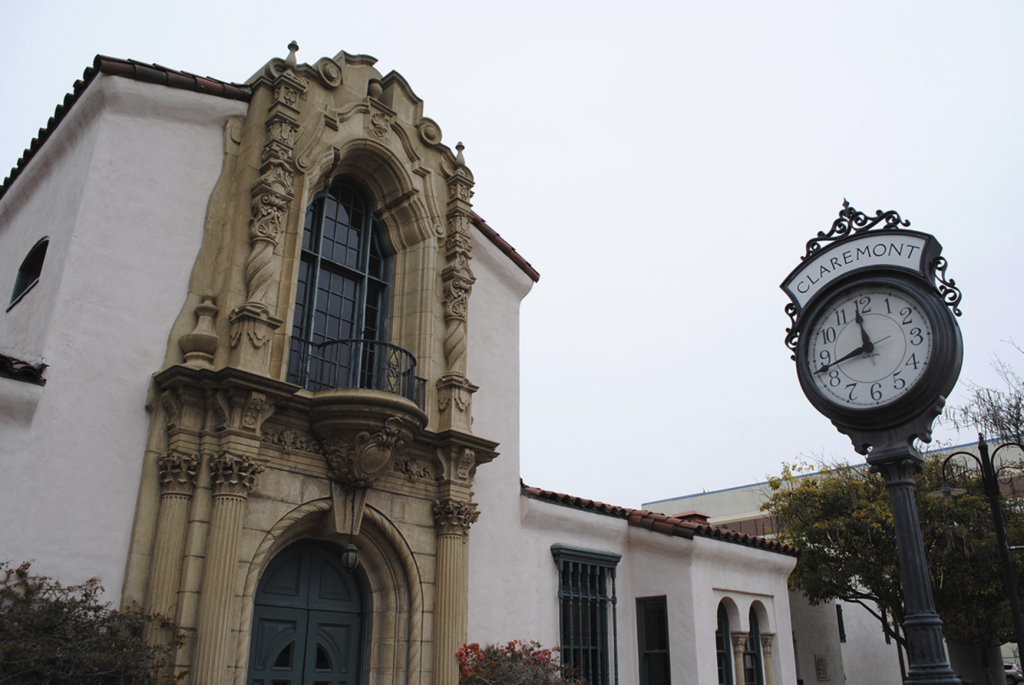By Eve Milusich
Last semester ended in a whirlwind of finals, theses, and fake snow (courtesy of Casemas), and amongst this end-of-the-year chaos rested the fate of the Claremont Metrolink station; namely, it’s possible demolition. Last summer, when a proposal came out to replace the stop with an extension of the Gold Line track, many expressed their opposition because it would shut down the current train stop for about 9 years. Come this past December though, residents of Claremont and 7C students alike came together en masse to voice their opinions. In an earlier issue of The Voice, staff writer Eve Kaufman spoke to the question of the Claremont Metrolink station and the costs and benefits of its retirement/replacement project. Here’s a quick summary.
- The Metrolink is the staple commuter train that connects relatively isolated smaller cities like Claremont, to LA and to each other. Despite the fact that the Metrolink is fully functional as-is, Amtrack, its owning company, has proposed measures to eliminate the track’s stop at Claremont, and later replace it with a cheaper, more streamlined Gold Line rail. This new line would allow $1.75 one-way trips to and from LA, versus the current fee of $9.25.
- The new line would also save the city about $30,000 annually, but the 9-year construction lag between the old station and the replacement one risks hurting the profits of local businesses. In other words, the ultimate savings might not even be worth it.
- With the completed Gold Line there will be a negligibly faster commute time for Claremont to LA. (However, are these 2 or 3 minutes’ worth waiting until 2027, the Gold Line’s predicted completion date?)
On one of the final few days of the semester, the village held a community meeting taking all these points into account. You might’ve seen fliers posted around campus calling for students to attend and express their support for keeping the station. Despite being held on a Monday night (arguably the worst time possible for a finals week study schedule), turnout for the event itself was enormous. The community center where the meeting was held was packed to the brim- all seats were filled and more people spilled outside the building- additional seating needed to be set up for a crowd of around 400 attendees. Out of this number, only 2 individuals were in support of abolishing the station- mainly on account of the cheaper fare, and the money that could ultimately be saved for the county with the relocation of the station, approximately 40 million. The other some 398 attendees voiced their various needs for the station; commuters who used the Metrolink to travel to work, students who needed affordable transport to and from schools and/or internships in the city, but also those residents who depend on the Claremont stop for other reasons. For starters, several owners of local businesses expressed their concern as well; official notes from the meeting state how “many [businesses] rely on clients and customers who can easily walk to their downtown business locations upon arrival to the Claremont station”. Other protests came from elderly residents or disabled community members who have limited mobility and rely heavily on the Claremont station for accessible transport. The Gold Line has proposed offering a temporary shuttle service between the Claremont to the Montclair terminals, but to many this solution seemed half-baked; some individuals with oversized wheelchairs would not be able to board these, whilst commenters at the meeting also stated that “the comfortable and spacious train cars [of the Metro] can easily accommodate their walkers, wheelchairs, and medical support equipment.” A final issue that was brought up at this meeting was how the elimination of the Claremont station would impact the city’s sustainability.
Claremont boasts one of the safest walking/biking networks in the U.S.- it’s been rated the 98th “most walkable city” by CityLab, a news outlet affiliated with Atlantic Media. Within walking distance to the station, the city offers relatively low-pollution transport options; the efficiency of these would be substantially reduced if the closest Metrolink stop was shifted out of reasonable walking range.
Following the success of this town meeting, city officials and residents headed to LA and took another stand- this time at the Metro headquarters themselves. The city offered to pay for tickets from Claremont to Union Station, helping foot the transport bill of nearly 70 residents. Both this show of support, and the points raised in the previous meeting were evidently enough to sway the Metro planning committee who unanimously voted in support of the old station. This is certainly a good sign, but nevertheless the ultimate decision will be down to the Metro-board itself.
By the time this paper has hit the stacks, a second meeting will have been held on Thursday the 25th, in LA at the Metro headquarters. Again, the city officials and residents alike are expected to attend. At this time, the Metro Planning Committee will file their support to the Metrolink board, and a decision will soon be made- hopefully, one to keep Claremont’s station intact and allow all individuals to keep their autonomy and maintain their ability to travel to and from the city for work, school, a weekend out, and so much more.



